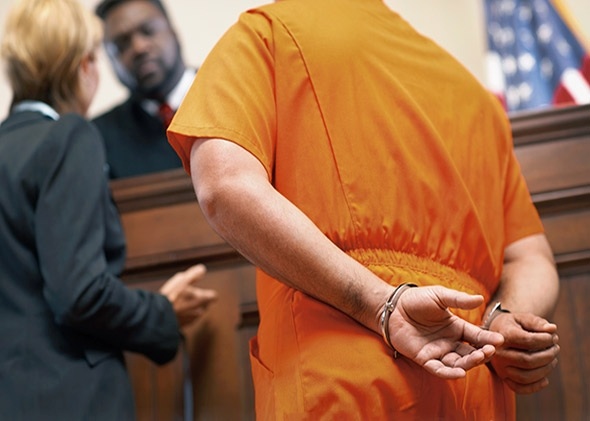North Carolina's bad [racist] plan to take lawyers away from poor [non-white] people: 80% of defendants qualify for free defense counsel. 90% plead guilty
 Wait, are you sure you want to plead guilty? An interesting photo for Slate Magazine to use for this article about the inadequate, mannequin like representation from court appointed attorneys; a Black judge in the background looking down on a white woman defense attorney and her white male client - a statistical rarity. Don't just believe, go and see - go down to your local arraignment and criminal courts and see for yourself - who is being locked up and by whom? Many (not all) of the non-whites involved (judges, defense attorneys, prosecutors and court staff) are there for show, like potted plants - w/o them it just wouldn't look right would it?/refinement of white supremacy.
Wait, are you sure you want to plead guilty? An interesting photo for Slate Magazine to use for this article about the inadequate, mannequin like representation from court appointed attorneys; a Black judge in the background looking down on a white woman defense attorney and her white male client - a statistical rarity. Don't just believe, go and see - go down to your local arraignment and criminal courts and see for yourself - who is being locked up and by whom? Many (not all) of the non-whites involved (judges, defense attorneys, prosecutors and court staff) are there for show, like potted plants - w/o them it just wouldn't look right would it?/refinement of white supremacy.
This article and this photo should be considered in the context of white supremacy/racism. White supremacy is carried out through deception and/or violence. Poor representation and substantial numbers of non-white people in greater confinement is the point.] [MORE]
From [HERE] and [MORE] Earlier this month, in an attempt to cut $2 million from its budget, North Carolina eliminated access to public counsel for thousands of poor criminal defendants each year. That’s not what the new law says: Tucked inside the state’s new budget, it reclassifies more than a dozen crimes into misdemeanors that cannot result in jail time. This is part of a pattern. Over the past two decades, swelling caseloads and fiscal belt-tightening have led several states, including Virginia and Minnesota, to create classes of crimes that can only be punished with a fine. In other states, the same thing happens case by case in the courtroom, where judges and prosecutors routinely declare they will not pursue jail time for minor infractions.
What’s not to like, if you’re caught with a small amount of drugs or driving without a license? The problem is that, left to fend for themselves in the courtroom, most defendants lack the basic legal skills to argue their innocence or reduce their punishment, and they’re often not told of the lifelong consequences that even minor convictions can carry. In an era when getting marked as criminal is often the severest punishment in itself, it makes increasingly little sense for only those facing incarceration to have a right to counsel.
The significance of petty convictions has changed a great deal since 1979, when the Supreme Court solidified this standard. Over the past three decades, the Internet has made criminal records available at a click, while public and private institutions have created myriad new restrictions on those with past convictions. More than ever, people with a record of misdemeanors, as well as felonies, are excluded from employment opportunities, student loans, food stamp eligibility, and professional licensing. A guilty plea to one of North Carolina’s new array of misdemeanors can enhance punishments for subsequent convictions. Also, an immigrant who racks up three or more misdemeanors can be deported. The same can happen with any one misdemeanor involving what the government deems “moral turpitude,” such as prostitution, selling drugs, or even writing a bad check.
Even before North Carolina’s new law took effect, judges commonly waived appointed counsel on small yet criminal marijuana charges, according to Matthew Suczynski, a criminal defense lawyer. “Most people being charged with marijuana possession are African-Americans, when they’re 17, 18 years old,” Suczynski told me. “Once they get convicted and have that mark against them, it’s nearly impossible to overcome. Those records are out there forever. It’s a system that just runs people over.”
More than 80 percent of defendants across the country are considered poor enough to be eligible for free defense counsel. At least 90 percent of all defendants will plead guilty to the charges they face. Researchshows that defendants who don’t have lawyers are even more likely to simply enter a guilty plea, pay a fine, and be done with the process. That makes it cheaper for courts to run efficiently. The price, though, is often a clear understanding of the ramifications of pleading guilty.